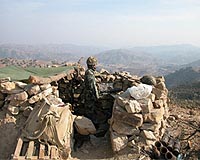| . |  |
. |
Washington (AFP) June 18, 2009 The release of a Pentagon investigation into deadly US air strikes in Afghanistan has been delayed amid an internal debate about what details of the report should be revealed, US officials said on Thursday. For days, Defense Department officials have promised to release an unclassified summary of the probe as well as video but have repeatedly postponed the move, saying the report is still being edited by top military officers and civilian officials. Some military officers had reservations about releasing certain details in the report, saying it could compromise security by giving away too much information about how American forces operate in Afghanistan, defense officials, who spoke on condition of anonymity, told AFP. The probe, ordered by the head of US Central Command, General David Petraeus, examined bombing raids on May 4 in the western Farah province in which the Kabul government says 140 civilians were killed. The report has illustrated the difficulties faced by the US military as it tries to improve its public relations efforts in Afghanistan, where insurgent propaganda has sought to sow distrust of NATO-led forces and exploit reports of civilian casualties. Defense Secretary Robert Gates told a news conference on Thursday that he supported the release of the report, which he expected to come in a "day or two." He said the incident was the first involving a possibly large civilian death toll since President Barack Obama took office in January and that the Defense Department wanted to allow enough time for other government agencies to review the report. Representatives from all the armed services and the State Department have been involved in discussions about what should be released publicly, said a spokesman for US Central Command. US officials have grown increasingly concerned about the effect of civilian casualties in the war, amid growing public anger in Afghanistan and tensions with the Kabul government over the issue. The internal debate over the report's release has followed calls from General Petraeus to change how the military communicates to the Afghan people and to allow battlefield commanders the authority to release information in a timely manner. Asked last week in Brussels if he was satisfied with the public presentation of the report into the air strikes, Gates said: "I think we could do better." The probe calls for a broad review of combat rules and training for US forces -- including refining guidance on the use of air power -- to reduce the risk of civilian casualties, said a defense official, who spoke on condition of anonymity. The Pentagon has said previously that the report found some procedures and tactics were not followed during the operation though it was not clear if the mistakes caused civilian casualties. "Some people on the ground were not aware of the (combat) rules," the defense official said. The chairman of the US Joint Chiefs of Staff, Admiral Mike Mullen, also endorsed the report and acknowledged that it pointed to shortcomings in training and how orders are passed down the chain of command. "There were command-and-control challenges, chain-of-command challenges, some training issues that we've got to address," said Mullen, appearing with Gates at the news conference. The probe, carried out by Brigadier General Raymond Thomas, reviewed video from aircraft called in to the fight as well as audio recordings of conversations between ground commanders and air crews. While Kabul officials put the civilian toll for the incident at 140, an earlier probe by the US military in Afghanistan found that 20-30 civilians were killed along with 60-65 insurgents. Afghanistan's top rights body has said 97 civilians, most of them children, were believed to have died. The air strikes involved F-18 fighter jets and a B-1 bomber, which at point lost contact with an intended target as it circled back to drop a 2,000-pound bomb, according to Pentagon officials. The incident began after insurgents attacked police checkpoints and local police called for help from Afghan and international security forces. Fighting then raged for several hours as US air power was called in. Gates said the problem of civilian casualties was a problem facing the entire international coalition force in Afghanistan, saying between 40 percent to 45 percent of close air support missions were carried out for non-US troops. Share This Article With Planet Earth
Related Links News From Across The Stans
 Suspected US strike kills nine in Pakistan tribal belt: officials
Suspected US strike kills nine in Pakistan tribal belt: officialsPeshawar, Pakistan (AFP) June 18, 2009 A suspected US missile strike killed up to nine people in Pakistan's northwest tribal belt on Thursday, where the military is poised to attack a feared Taliban commander, officials said. The attack hit 20 kilometres (12 miles) from the main town of Wana in South Waziristan, where Washington says Al-Qaeda and Taliban rebels who fled after the 2001 invasion of Afghanistan are hiding, plotting ... read more |
|
| The content herein, unless otherwise known to be public domain, are Copyright 1995-2009 - SpaceDaily. AFP and UPI Wire Stories are copyright Agence France-Presse and United Press International. ESA Portal Reports are copyright European Space Agency. All NASA sourced material is public domain. Additional copyrights may apply in whole or part to other bona fide parties. Advertising does not imply endorsement,agreement or approval of any opinions, statements or information provided by SpaceDaily on any Web page published or hosted by SpaceDaily. Privacy Statement |